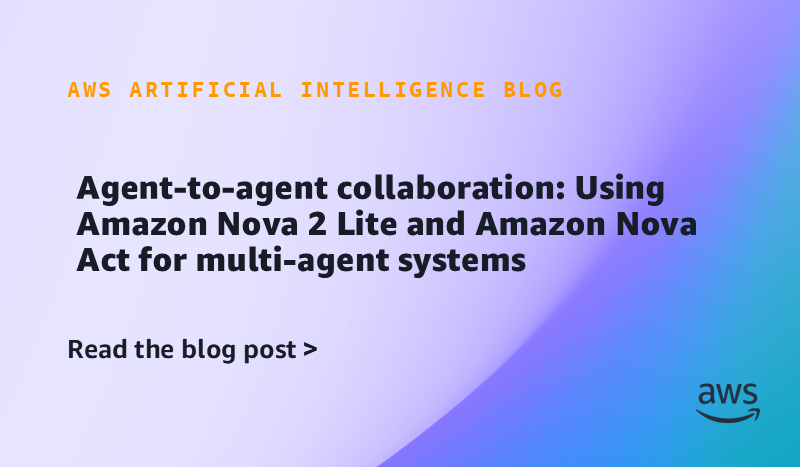Artificial Intelligence
Category: Amazon Machine Learning
Automated Reasoning checks rewriting chatbot reference implementation
This blog post dives deeper into the implementation architecture for the Automated Reasoning checks rewriting chatbot.
New Relic transforms productivity with generative AI on AWS
Working with the Generative AI Innovation Center, New Relic NOVA (New Relic Omnipresence Virtual Assistant) evolved from a knowledge assistant into a comprehensive productivity engine. We explore the technical architecture, development journey, and key lessons learned in building an enterprise-grade AI solution that delivers measurable productivity gains at scale.
Accelerate agentic application development with a full-stack starter template for Amazon Bedrock AgentCore
In this post, you will learn how to deploy Fullstack AgentCore Solution Template (FAST) to your Amazon Web Services (AWS) account, understand its architecture, and see how to extend it for your requirements. You will learn how to build your own agent while FAST handles authentication, infrastructure as code (IaC), deployment pipelines, and service integration.
Agent-to-agent collaboration: Using Amazon Nova 2 Lite and Amazon Nova Act for multi-agent systems
This post walks through how agent-to-agent collaboration on Amazon Bedrock works in practice, using Amazon Nova 2 Lite for planning and Amazon Nova Act for browser interaction, to turn a fragile single-agent setup into a predictable multi-agent system.
Structured outputs on Amazon Bedrock: Schema-compliant AI responses
Today, we’re announcing structured outputs on Amazon Bedrock—a capability that fundamentally transforms how you can obtain validated JSON responses from foundation models through constrained decoding for schema compliance. In this post, we explore the challenges of traditional JSON generation and how structured outputs solves them. We cover the two core mechanisms—JSON Schema output format and strict tool use—along with implementation details, best practices, and practical code examples.
Evaluate generative AI models with an Amazon Nova rubric-based LLM judge on Amazon SageMaker AI (Part 2)
In this post, we explore the Amazon Nova rubric-based judge feature: what a rubric-based judge is, how the judge is trained, what metrics to consider, and how to calibrate the judge. We chare notebook code of the Amazon Nova rubric-based LLM-as-a-judge methodology to evaluate and compare the outputs of two different LLMs using SageMaker training jobs.
How Associa transforms document classification with the GenAI IDP Accelerator and Amazon Bedrock
Associa collaborated with the AWS Generative AI Innovation Center to build a generative AI-powered document classification system aligning with Associa’s long-term vision of using generative AI to achieve operational efficiencies in document management. The solution automatically categorizes incoming documents with high accuracy, processes documents efficiently, and provides substantial cost savings while maintaining operational excellence. The document classification system, developed using the Generative AI Intelligent Document Processing (GenAI IDP) Accelerator, is designed to integrate seamlessly into existing workflows. It revolutionizes how employees interact with document management systems by reducing the time spent on manual classification tasks.
A practical guide to Amazon Nova Multimodal Embeddings
In this post, you will learn how to configure and use Amazon Nova Multimodal Embeddings for media asset search systems, product discovery experiences, and document retrieval applications.
Accelerating your marketing ideation with generative AI – Part 2: Generate custom marketing images from historical references
Building upon our earlier work of marketing campaign image generation using Amazon Nova foundation models, in this post, we demonstrate how to enhance image generation by learning from previous marketing campaigns. We explore how to integrate Amazon Bedrock, AWS Lambda, and Amazon OpenSearch Serverless to create an advanced image generation system that uses reference campaigns to maintain brand guidelines, deliver consistent content, and enhance the effectiveness and efficiency of new campaign creation.
Democratizing business intelligence: BGL’s journey with Claude Agent SDK and Amazon Bedrock AgentCore
BGL is a leading provider of self-managed superannuation fund (SMSF) administration solutions that help individuals manage the complex compliance and reporting of their own or a client’s retirement savings, serving over 12,700 businesses across 15 countries. In this blog post, we explore how BGL built its production-ready AI agent using Claude Agent SDK and Amazon Bedrock AgentCore.









